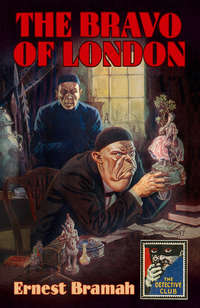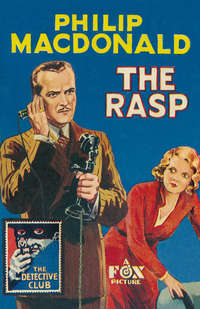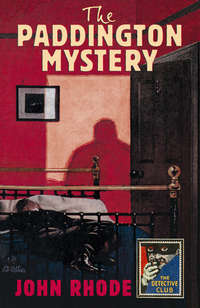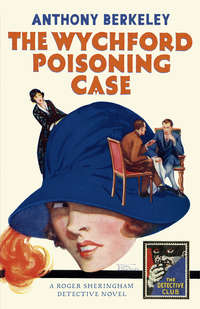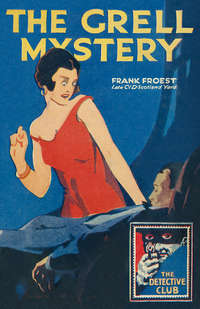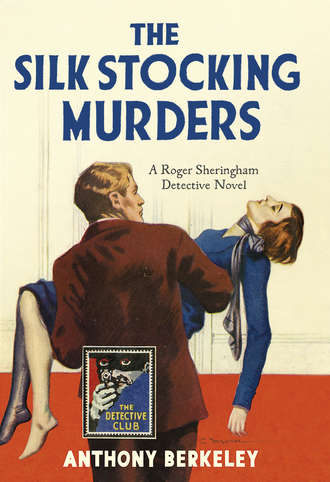
Полная версия
The Silk Stocking Murders
‘It’s in a prayer-book of hers. I only came across it the other day. Would you like to see it?’
‘I would,’ said Roger.
Obligingly Miss Carruthers ran off to fetch it. Returning, she opened the book at the fly-leaf and handed it to Roger. He read: ‘To my dear Janet, on her Confirmation, 14th March 1920. “Blessed are the pure in heart.”’ The writing was small and crabbed.
‘I see,’ Roger said, and took a later opportunity of slipping the book into his pocket. Miss Carruthers had definitely established the main point, at any rate.
He directed his questions elsewhere. Like Miss Carruthers, Roger had been struck with the idea that there might be a man behind things. He dredged assiduously in his informant’s mind for any clue as to his possible identity. But here Miss Carruthers was unable to help. Uny, it appeared, hadn’t cared for boys. She never went out with one alone, and would seldom consent to make up a foursome. She said frankly that boys bored her stiff. So far as Miss Carruthers knew, not only had she no particular boy, but not even any gentlemen-friends.
‘Humph!’ said Roger, abandoning that line of enquiry.
They sat and smoked in silence for a moment.
‘If you wanted to commit suicide, Miss Carruthers,’ Roger remarked abruptly, ‘would you hang yourself?’
Miss Carruthers shuddered delicately. ‘I would not. It’s the very last way I’d do it.’
‘Then why did Miss Ransome?’
‘Perhaps she didn’t realise what she’d look like,’ suggested Miss Carruthers, quite seriously.
‘Humph!’ said Roger, and they smoked again.
‘And with one of the stockings she was wearing,’ mused Miss Carruthers. ‘Funny, wasn’t it?’
Roger sat up. ‘What’s that? One of the stockings she was actually wearing?’
‘Yes. Didn’t you know?’
‘No, I didn’t see that mentioned. Do you mean,’ asked Roger incredulously, ‘that she actually took off one of the stockings she was wearing at the time, and hanged herself with it?’
Miss Carruthers nodded. ‘That’s right. A stocking on one leg, she had, and the other bare. I thought it was funny at the time. On that very door, it was; and you can still see the screw-mark the other side. The screw I took out, of course. I couldn’t have borne to look at it every time I came into the room.’
‘What screw?’ asked Roger, at sea.
‘Why, the screw on the other side of the door, that she fastened the loop to.’
‘I don’t know anything about this. I took it for granted that she’d done it on a clothes’-hook, or something like that.’
‘Well, I wondered about that,’ said Miss Carruthers, ‘but I expect it was because the hook in the bedroom was too low. And a stocking’d give a good bit, wouldn’t it?’
Roger was already out of his chair and examining the door. ‘Tell me exactly how you found her, will you?’ he said.
With many shudders, some of which may have been quite real, Miss Carruthers did so. Janet, it appeared, had been hanging on the inside of the sitting-room door, from a small hook on the other side, which had been screwed in at the right angle to withstand the strain. The stocking round her neck had been knotted together tightly at the extreme ends. As far as one could gather, she must have placed it like that loosely round her neck, then twisted the slack two or three times, and slipped a tiny loop on to the hook on the further side of the door, over the top. She had been standing on a chair to do this, and she must have kicked the chair violently away when her preparations were complete, with such force as to slam the door to, leaving herself suspended by the little hook that was now completely out of her reach, so that she could not rescue herself even had she wished. This was an obvious reconstruction on the two facts that Miss Carruthers had found the door shut when she arrived, and an overturned chair on the floor at least six feet away.
‘Good God!’ said Roger, shocked at this evidence of such cold-blooded determination on the part of the unfortunate girl to deprive herself of life. But he realised at once that this version did not square with his theory of panic-stricken impulse. Panic-stricken people do not waste time adjusting things to such a nicety, screwing in hooks at just the right height and leaving every trace of thoughtful deliberation; they simply throw themselves, as hurriedly as possible, out of the nearest window.
‘Didn’t the police think all this very odd?’ he queried thoughtfully.
‘No-o, I don’t think they did. They seemed to take it all for granted. And after all, as Uny did kill herself, it doesn’t matter much how, does it?’
Roger was forced to agree that it didn’t. But when he took his leave a few minutes later, to write that letter to Dorsetshire which must now put things beyond all hope, he was more than ever convinced that there was very, very much more in all this than had so far met the eye. And he was more than ever determined to find out just exactly what it might be.
The thought of that happy, laughing kid of the snapshot being driven into panic-stricken suicide had inexpressibly shocked him before. The thought of her now, driven into a deadly slow suicide, prepared with such tragic method and care, was infinitely more horrible. Somebody, Roger was sure, had driven that poor child into killing herself; and that somebody, he was equally sure, was going to be made to pay for it.
CHAPTER IV
TWO DEATHS AND A JOURNEY
NEVERTHELESS, during the next few days the case against the unknown made little progress. Roger received a reply to his letter from Dorsetshire which served to inflame his anxiety to get to the bottom of the affair, but his efforts in that direction seemed to be beating upon an impassable barrier. Try as he might, he could not connect Unity Ransome with any man.
He tried the theatre. Of any girl who had been at all friendly with her he asked long strings of questions, the eager Miss Carruthers constantly at his elbow. Under her protecting wing he interviewed stage-doorkeepers, stage-managers, managers, producers, stars, their male equivalents, and everybody else he could think of, till he had acquired enough theatrical copy to last him the rest of his life. But all to no purpose. Nobody could remember having seen Unity Ransome with the same man more than once or twice; to nobody had she ever mentioned the name of a male acquaintance in anything but a joking way.
He cast his net further afield. Armed with half-a-dozen pictures of Janet, enlarged from the groups outside the theatre, he sought out the restaurant-managers, waiters, tea-shop waitresses and hotel-keepers, whose various establishments Janet might have patronised. Here and there she was recognised, but it never went beyond that. Roger was discouraged.
One fact however, although it had no bearing on the subject of his search, did emerge during this busy week. Miss Carruthers having firmly appointed herself his theatrical guide and dramatic friend, Roger got into the habit of dropping in every other day or so at tea-time to report his lack of progress. The little creature with her preposterous name (she had confided by this time that her real one was Sally Briggs, ‘and what the hell,’ she asked wistfully, ‘is the use of that to me?’) both amused and interested him. It was a perpetual joy to him to watch how even in her most real moments she could not help being consciously dramatic: with genuine tears for her friend’s fate streaming down her cheeks she would yet hold them up for the admiration of an invisible gallery. In fact, Roger reflected, watching her, when she was at her most genuine, she was most artificial.
On one of these occasions he took advantage of her absence in the kitchen to study with minute care the fatal door. What he saw there upset him considerably. For it was obvious that, however anxious she might have been beforehand, when it actually came to the point Janet had not at all wanted to die. At the bottom of the door, only a few inches off the ground, was a maze of deep scratches in the paintwork, such as might have been made by a pair of high heels trying desperately to find some sort of foothold, however minute, by which to stave off eternity.
Roger’s imagination was a vivid one. He felt rather sick.
‘But why,’ he asked himself, frowning, ‘didn’t she grip the stocking above her neck and pull on that, at any rate for a few minutes? She could have been saved if she had. But I suppose there wasn’t enough of it to grip on.’
He turned his attention to the top of the door. There at the sides, and some little way down as well, were other scratches, fainter, but not to be mistaken. He walked out into the kitchen.
‘Moira,’ he said abruptly, ‘what were Unity’s nails like? Do you happen to remember?’
‘Yes,’ said Miss Carruthers, with a little shiver. ‘All broken and filled with paint and stuff.’
‘Ah!’ said Roger.
‘And she used to keep them so nice,’ said Miss Carruthers.
London having thus proved blank, Roger determined to try the country. He felt a little diffident about intruding upon the grief-stricken family, and uncertain whether to acquaint the vicar with his suspicions or not. In the end he decided not to do so until he had more evidence to support them; what he possessed already would merely add to the old man’s distress without effecting anything helpful. He trusted to his usual luck to acquire the information he wanted (if it was to be acquired) by some other means.
Having made up his mind, Roger acted with his usual impulsiveness. If he were to go at all, he would go the next day. But the next day was a Friday, and Tuesdays and Fridays were the days on which he spent the morning at The Courier offices. Very well, then; he would write his article that evening, merely call in at The Courier building to leave it and collect his post, and so catch an early train down to Dorsetshire. Excellent.
To turn out two articles a week for several months on the subject of sudden death is not, after the sixth month or so, an easy task. Having exhausted most of the topics on which he had wanted to spread himself, Roger was beginning to find the search for fresh ones getting rather too arduous. And now that he was anxious to polish one off in a hurry, of course no subject would present itself. After nibbling the end of his fountain-pen for half-an-hour, Roger ran down into the street to buy an evening paper. When inspiration fails, a newspaper will sometimes work wonders.
This one certainly came up to expectations. On the front page, in gently leaded type to show that, while startling, it could hardly be considered important, were the following headlines:
LONDON FLAT TRAGEDY
GIRL HANGS HERSELF WITH OWN STOCKING
PATHETIC LETTER
Roger was able to write a very informative article indeed, all about mass-suggestion, neurotic types, predisposition to suicide and how it is stimulated by example, and the lack of originality in most of us. ‘Within a few weeks of the first genius discovering that he could end his life by lying with his head in a gas-oven,’ wrote Roger, ‘more than a dozen had followed his lead.’ And he went on to prove that a novel method of ending life, whether one’s own or another’s, acts in such a way upon a certain type of mind that it constitutes a veritable stimulus to death. He instanced Dr Palmer and Dr Dove, Patrick Mahon and Norman Thorne, and, of course, the twin stocking tragedies. Altogether the article was in Roger’s best vein, and he was not a little pleased with it.
The next day he set off for Dorsetshire.
In his morning paper (not The Daily Courier) which he had been saving up to read in the train, was a rather fuller account of the tragedy, though now relegated to an unimportant page. Roger was quite gratified to observe that such details as were given corresponded almost exactly with those of Janet’s case; its perpetrator evidently corresponded exactly to the type which he had described so meticulously last night. Whatever he might feel for Janet, Roger had no sympathy with this girl; she was of the kind which is far better out of this world than in it. And she had copied poor little Janet with a slavishness that was really rather nauseating: the silk stocking tied in a single loop and twisted over the door, the screwed hook on the further side, the bare leg, the unsigned note—they were all there.
Her name was Elsie Benham, ‘described as an actress’, as the paper cautiously put it. (‘And of course we know what that means,’ Roger commented caustically. ‘Why do they always “describe themselves as actresses?” It’s uncommonly tough on the real ones.’) She was known as a habituée of night-clubs (‘That’s more like it’) and had been seen at one on the night of the tragedy. She was alone, and a friend who spoke to her mentioned that she seemed depressed. She left alone, at two o’clock in the morning, and must have killed herself very soon after reaching the flat which she shared with another friend who is at the moment out of London (‘Euphemism for weekending in Paris,’ observed the sarcastic reader), for when she was discovered yesterday afternoon by a man who possessed a key to the flat (‘As I said’) the doctor who was hurriedly summoned gave it as his opinion that she had been dead for at least twelve hours. ‘Which is not a bad sentence, even for this rag,’ thought Roger.
He skimmed through the rest of the report, tossed the newspaper aside and opened a novel.
It was not till two hours later, as he was idly watching the fields fly past the window, that two things struck Roger. The evening paper had exaggerated when it spoke of the pathetic ‘letter’ left by the dead girl. It was not a letter; it was merely a quotation. ‘How wonderful is Death!’ she had written on a blank piece of paper. ‘Death and his brother Sleep.’
‘How wonderful is Death.
Death and his brother Sleep,’
murmured Roger. ‘It’s curious that a lady “described as an actress” and known as a habituée of night-clubs should choose to quote Queen Mab on such an occasion. It’s curious that she could quote Shelley at all. It’s very curious that she would quote him correctly; I’d have taken a small bet that any lady “described as an actress” who might improbably have a nodding acquaintance with Shelley, would quote: “How beautiful is Death.” Very curious; but not, apparently, impossible. Well, well, there must be more things in our night-clubs, Sheringham, than are dreamt of in your philosophy.’
He watched a few more fields slide past.
‘And here’s another funny thing,’ thought Roger. ‘All the papers this time feature the bare leg. But the bare leg wasn’t mentioned before, in any of the accounts I read. When Moira told me, it was complete news to me. I wonder how this woman got hold of that. I suppose it must have been alluded to in some paper I never saw; though I certainly thought I’d studied them all at one time or another. Curious.’
He went on watching the fields, and set to wondering what he was going to say to Mr Manners. The nearer he got to Dorsetshire, the more impertinent his mission began to appear.
In the end he decided not to try the village inn at Little Mitcham, as had been his first intention, but to put up in the neighbouring town of Monckton Regis. This would look less intrusive. He could then, finding himself so near to Mr Manners, go over to Little Mitcham to pay his respects with perfect propriety.
This course he duly followed. Mr Manners welcomed him eagerly, carried him off at once to his study, and plied him with questions which Roger found a good deal of difficulty in answering tactfully. The old man seemed very depressed, as was only to be expected, but his grief was dignified and unembarrassing. Pressed with warmth to stay to luncheon and meet the rest of the family, Roger acceded after protest, quietening his conscience with the reflection that at such a time as this the presence of a stranger might be a blessing in disguise to the stricken household; at the least it would take their minds for a few hours off their loss.
The other four daughters were aged respectively twenty-four, seventeen, fourteen and twelve, and with the eldest, Anne, Roger found himself almost immediately on terms of good friendship. She was one of those capable girls whom the emergency seems so often to produce; and unlike most capable girls, she was good to look upon as well. Not so pretty as Janet had been, perhaps, but in a way more beautiful, and built in miniature; and her air of reposeful efficiency (not the assertive efficiency which most capable women possess) Roger found extremely attractive. Making his mind up with his usual rapidity during lunch, he sought an opportunity after the meal was over to take her aside, and, under pretext of admiring the garden in its garment of budding spring, proceeded to tell her the whole story.
If Anne was shocked, she scarcely showed it; if she was much upset, she concealed her feelings. She merely replied, gravely: ‘I see. This is extraordinarily good of you, Mr Sheringham. And thank you for telling me; I much prefer to know. I quite agree with your conclusions, too, and I’ll do anything to help you confirm them.’
‘And you can?’ Roger asked eagerly.
Anne shook her small head. She was small all over, delicately boned, with small, rather serious features set in a small, oval face. ‘At the moment,’ she confessed, ‘I don’t see that I can. Janet knew plenty of men round here, of course, and I can give you a list of the ones she knew best, but I’m quite sure that none of them could be at the bottom of it.’
‘We could at any rate find out which of them had been in London since she went up there,’ Roger said, loath to abandon the line on which all his hopes were now pinned.
‘We could, of course,’ Anne agreed. ‘And we will, if you think we should. But I’m convinced, Mr Sheringham, that it isn’t here that we must look for the cause of my sister’s death. When she left here she hadn’t a care in the world, I know. Janet and I—’ Her voice faltered for a moment, but recovered immediately—‘Janet and I were a good deal more than sisters; we were the most intimate of friends. If she’d been worried before she left here, I’m certain she would have told me.’
‘Well,’ said Roger, with more cheerfulness than he felt, ‘we’ll simply have to see what we can do; that’s all.’
The upshot was that Roger spent a very pleasant weekend in Dorsetshire, saw a great deal of Anne, who, to his great delight, did not seem to have the faintest wish to discuss his books with him, and returned to London on the Monday apparently not an inch nearer his objective. ‘Though a weekend in Dorsetshire in early April,’ he told the lady in the office as he paid his hotel-bill, ‘is a thing no man should be without.’
‘Quate,’ agreed the young lady.
Roger strolled down to the station. He had made a point of mentioning to Anne the time of his train, in case anything cropped up that she might want to communicate to him at the last moment. As he walked on to the platform, he looked up and down to see if she were there. She was not.
With a sense of disappointment which he could not remember having experienced for at least ten years, and of which he became instantly as near to being ashamed as Roger could concerning anything connected with himself, he made his way to the bookstall and bought a paper. Opening it a few minutes later, his eye at once caught certain headlines on the centre page. The headlines ran as follows:
ANOTHER SILK STOCKING TRAGEDY
SOCIETY BEAUTY HANGS HERSELF
LADY URSULA GRAEME’S SHOCKING FATE
‘This,’ said Roger, ‘is becoming too much of a good thing.’
CHAPTER V
ENTER CHIEF-INSPECTOR MORESBY
SEATED in the train, Roger began to peruse the account of Lady Ursula’s death. Now that it had to deal with the daughter of an earl instead of an obscure habituée of night-clubs, the story had been allotted two full columns on the centre page, and every detail, relative or not, that could be hastily scraped together had been inserted. Briefly, the facts were as follows.
Lady Ursula had left her home in Eaton Square, where she lived with her widowed mother (the present Earl, her eldest brother, was in the Diplomatic Service abroad), shortly before eight. She dined with a party of friends at a dance-club in the West End, where she stayed, dancing and talking, till about eleven. She then began to complain of a headache and tried to induce one of the others to accompany her for a little run in her car; the rest of the party refused, however, as it was raining and the car was an open two-seater. Lady Ursula then left the club, saying that she would go for a run alone to blow her headache away, if no one would accompany her.
At half-past two in the morning a girl called Irene Macklane, an artist and a friend of Lady Ursula’s, returned to her studio in Kensington from a party in a neighbouring studio and found Lady Ursula’s car outside. She was not surprised at this, as Lady Ursula was in the habit of calling on her friends at the most unusual of times of the day and night. On going inside and calling, however, she could at first see no sign of her.
The studio had been made out of the remains of some old stables, and spanning its width in the centre was a large oak beam, some eight feet above the ground, in the middle of which, on the underside, was a large hook, from which Miss Macklane had hung an old-fashioned lantern. This lantern contained an electric light bulb which was connected by a flex to a light-point farther down the room. On turning the switch at the door, Miss Macklane was surprised to see the lantern light upon the floor some distance away from the beam instead of in its normal position. She lifted it up and was then horrified to see Lady Ursula hanging in its place from the hook in the beam.
The details of her death corresponded almost exactly with those of Janet’s and the other woman’s. An overturned table lay on the floor a few feet away, and Lady Ursula had made use of one of the stockings which she was wearing at the time; the leg from which she had taken it was bare, though the foot still wore its brocade slipper. A loop had been formed by tying the extreme ends of the stocking together, this had been passed over Lady Ursula’s head, the slack twisted round three or four times, and a tiny loop at the end slipped over the hook. She had then apparently kicked the table away and met her death, like the other two, from slow asphyxiation.
The note she had left for Miss Macklane, however, was a little more explicit than those of the others, though its wording gave scope for conjecture. It ran:
I’m so sorry to have to do this here, my dear, but there’s simply nowhere else, and mother would have a fit if I did it at home. Don’t be too terribly furious with me!
U.
There followed a eulogistic account of Lady Ursula, ‘by a friend,’ expatiating on her originality, her lack of convention and her recent engagement to the wealthy son of a wealthy financier. Whether it was the engagement, or her determination at all costs to be original, that had led Lady Ursula to dispense with a life with which, as she was in the habit of informing her friends, she had for many years been bored stiff, the writer obviously found some difficulty in avoiding.
Roger put the paper across his knees and began absently to fill his pipe. This was, as he had commented, too much of a good thing. It was becoming a regular epidemic. Fantastic pictures floated across his mental vision of the thing becoming a society craze, and all the debutantes suspending themselves in rows by their own stockings. He pulled himself together.
The real trouble, of course, was that this did not square with the article he had written before leaving London. It upset things badly. For though the unknown habituée of night-clubs might have possessed the predisposition to suicide about which he had expatiated so glibly, he was quite sure that Lady Ursula Graeme did not. And from what he knew about the lady, even apart from the friend’s article upon her, he was still more sure that, if by any strange chance she had decided to do away with herself, she would most certainly not imitate the method of an insignificant chorus-girl and a wretched little prostitute. If she were to imitate anybody it would be in the grand manner. She might cut an artery in a hot bath, for instance. But far more probably she would evolve some daringly unconventional method of suicide which should ensure her in death an even greater publicity than she had been able to attain in life. Lady Ursula, in short, would set the fashion in suicide, not follow it.


